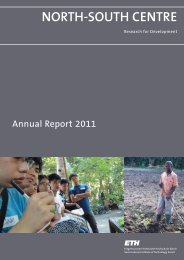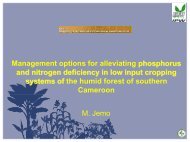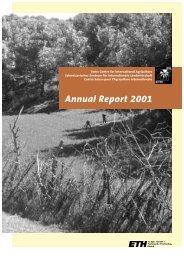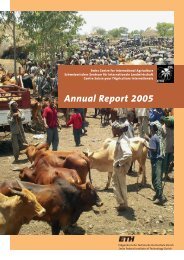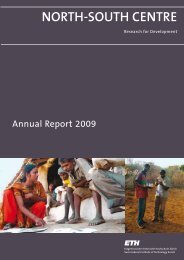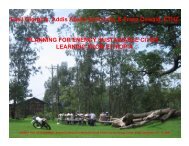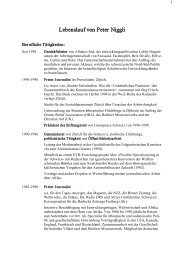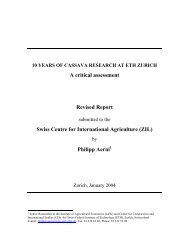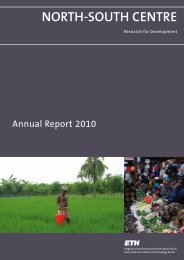Annual Report 2006/07 - ETH - North-South Centre North-South ...
Annual Report 2006/07 - ETH - North-South Centre North-South ...
Annual Report 2006/07 - ETH - North-South Centre North-South ...
Create successful ePaper yourself
Turn your PDF publications into a flip-book with our unique Google optimized e-Paper software.
ZIL research project, Phase VProject leadersStefanie Engel / Andrea MayerContact personAstrid ZabelCollaboratorsAnil Gupta, Indian Institute of Management, India /Robin Reid, Mohammed Said, ILRI, Kenya / PoojaSawhney, Adelphi Research GmbH, Germany / JeffSayer, WWF International, Switzerland / GöranBostedt, Swedish University of Agricultural Sciences /Thomas Sterner, Göteborg University, Sweden /Michael Kreuzer, <strong>ETH</strong> ZurichDurationApril 20<strong>07</strong> – March 2010ZIL research projectsLivestocksystemsresearchEnvironmentNew policy mechanisms to mitigate wildlife-livestockconflicts in Bandhavgarh National Park in IndiaAround the world the population sizes of many large carnivorespecies have dramatically dropped in recent years.Although appreciated by many as charismatic and beautifulanimals, large carnivores can impose serious hardships onpoor farmers who herd livestock in or close to a carnivore’shabitat. In consequence, herders often seek to eliminate theproblem-causing carnivores. Many programmes such as expostcompensation have been launched as an attempt toalleviate the economic hardship of predation incidents, butfew have successfully reduced incentives to poach.The goal of this interdisciplinary project is to assess thepotential of new policy mechanisms, in particular performancepayments, to mitigate wildlife-livestock conflicts.Performance payments are made to livestock herders basedon the number of carnivore offspring that are certified on thelivestock’s grazing grounds.The research project can be subdivided into three parts. Thefirst part focuses on developing theoretical models to comparethe strengths and weaknesses of performance paymentswith conventional ex-post compensation.The second part of the project is devoted to an empiricalassessment of the determinants of success of the Swedish –and world-wide first – performance payment scheme in acarnivore-livestock context.The third part focuses on the transferability of a performancepayment scheme to a developing country context. Forconcreteness we intend to assess the applicability of thescheme to the Bandhavgarh National Park Tiger Reserve inIndia. In the Park we will conduct both interviews and fieldstudies. In order to fathom why domestic animals enter theforest where the tiger lives and where conflicts with tigers orSolving wildlife-livestock conflicts is essential to preserve biodiversity and safeguardlivelihoods of poor livestock owners. (Source: Save The Tiger Fund)tigers’ prey species might occur, we will assess which plantspecies they browse and graze through direct observations ofthe grazing animals (including bite counts). A major researchfocus will be on assessing the nature of dependenciesbetween vulnerability to wildlife-livestock conflicts (in particularpredation issues and competition for food), livestockhusbandry systems, and poverty.29




